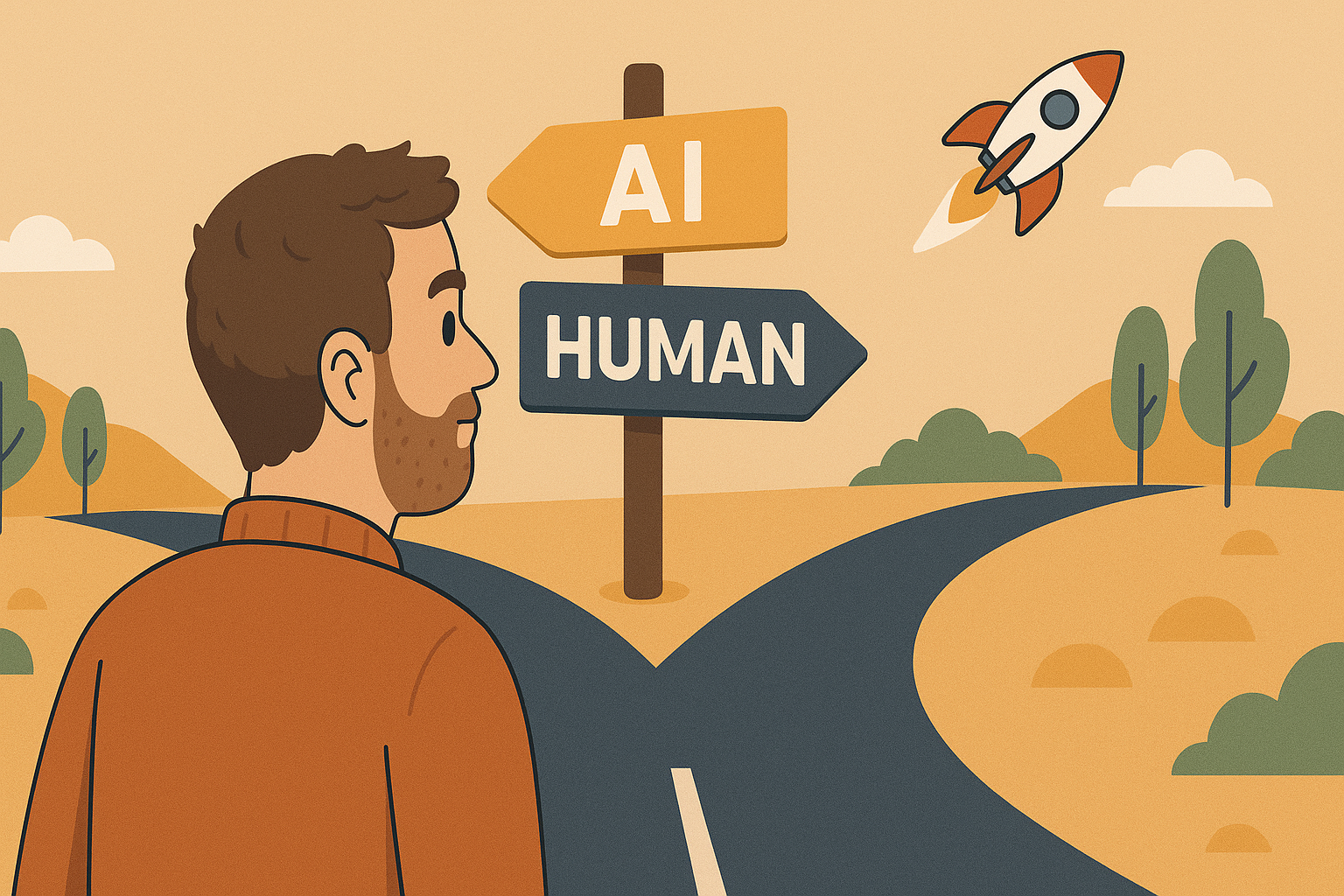21 May

AI is everywhere right now — and for good reason. The tools are fast, clever, and often shockingly good. But if you’re an early-stage founder, it’s easy to fall into the trap of thinking AI can do everything. Spoiler: it can’t.
This post is your reality check. AI is a brilliant tool — but just like any tool, it’s only useful when you know what job you’re trying to do. You need to know when you need a hammer or a screwdriver or a saw, and having the wrong tool can cost you a lot of time and money… been there with too many trips to B&Q.
Here’s how to figure out when AI will genuinely help you move faster… and when it’s better to rely on human intuition, judgment, or conversation.
Use AI When Speed or Scale Is the Priority
Idea Generation and Brainstorming
If you’re stuck on naming your startup, crafting a strapline, or figuring out 10 ways to position your offer — AI is brilliant at giving you a starting point.
Try: “Give me 10 startup names for a tool/platform that helps…”
You might not use the exact outputs, but they’ll help you refine your thinking fast. I’ve used this with a few startups I’ve worked with just for inspiration and the results have been surprisingly useful
Customer Research at Scale
Need to understand your audience or simulate responses from different customer types? AI can roleplay your personas and help you refine your pitch or product-market fit.
Try: “Act as a startup founder who’s struggling with time management. What kind of solution would appeal to you?”
It’s not a replacement for real customer conversations — but it’s a good warm-up. I’ve seen folks building this out to not just be customers as well, even having full virtual boards and cofounders.
Automating Repetitive Tasks
Writing cold emails, summarising transcripts, cleaning up messy data — AI excels at the boring stuff, and there are a lot of tools for that. personally I’m a big fan of firefly for meeting recording and transcripts, but another few examples that’ll help:
- Automate your LinkedIn DMs with tools like Taplio.
- Use ChatGPT or Claude to summarise customer interviews.
- Plug OpenAI into Notion or Airtable for intelligent workflows.
It won’t replace your strategy for these things – so you’ll still always need the human touch. But it will save you a lot of time.
Skip AI When Understanding People Matters
Validating a Problem or Idea
You can’t AI your way into knowing what real customers care about. You may have noticed that I’m a big fan of the phrase ‘get out of the building’ to test ideas… even with AI, this still applies and the human touch is crucial!
AI can guess what people might say. But only real humans can tell you what they actually do.
You need conversations, surveys, or observational insights to understand pain points. AI should support your research — not replace it. Some of the learnings I’ve had over the years are even watching what people were doing in demos, and AI just can’t do that (yet).
Building Trust
Whether you’re onboarding early customers, pitching to investors, or hiring your first team member — AI can help you prep. But the relationship-building part? That’s all you.
Use AI to practice the pitch, not deliver it.
People invest in people. Don’t outsource your authenticity, or if you do… just accept that the results and replies may be as generated as your initial outreach. The best example here of the perfect union was recently helping a founder try and find customers and AI helped scour the web for the folks we were looking for, which could have taken hours. But then we hand crafetd each email as to why we were what they needed so as to not lose the fact we’re experts and understand their problem and their need.
Making Strategic Decisions
AI can give you ideas. It can show you frameworks. It can scour the web for information. But strategy requires judgment, context, and risk-taking — things AI isn’t great at (yet).
If you’re debating between two positioning options or trying to decide whether to pivot, use AI to weigh pros and cons — but trust your own instincts (or better yet, speak to customers). There is a reason you’re the founder, and it’s to make those key decisions as you’re the expert in all of this, after all there is a reason you came up with your company.
A Simple Rule of Thumb
If the task is about execution or scale — AI is your friend. If it’s about empathy, judgment, or trust — keep it human.
Startups live and die on customer understanding, fast learning, and real-world traction. Don’t hide behind AI. Use it to get clarity faster — and then make the hard calls yourself.
Use AI where you need it, Not Everywhere
I’m a big fan of AI — not because it replaces founders (or from just wanting to have my own copy of J.A.R.V.I.S from Iron Man), but because it amplifies them. Used well, it can make solo founders move like a team of five, and I’ve seen it done.
Used blindly, it can lead you miles in the wrong direction… and it’s bloody obvious when that’s happened. How many emails do you recieve and you know it’s been AI produced. I get tonnes
So ask yourself: is this a job for speed… or a job for sense?
If you’re unsure how to build your MVP, validate a problem, or even figure out which tools are right for your startup, drop us a message. I’ll help you figure out what to build — and how to use AI in a way that actually makes a difference, rather than holding you back.

